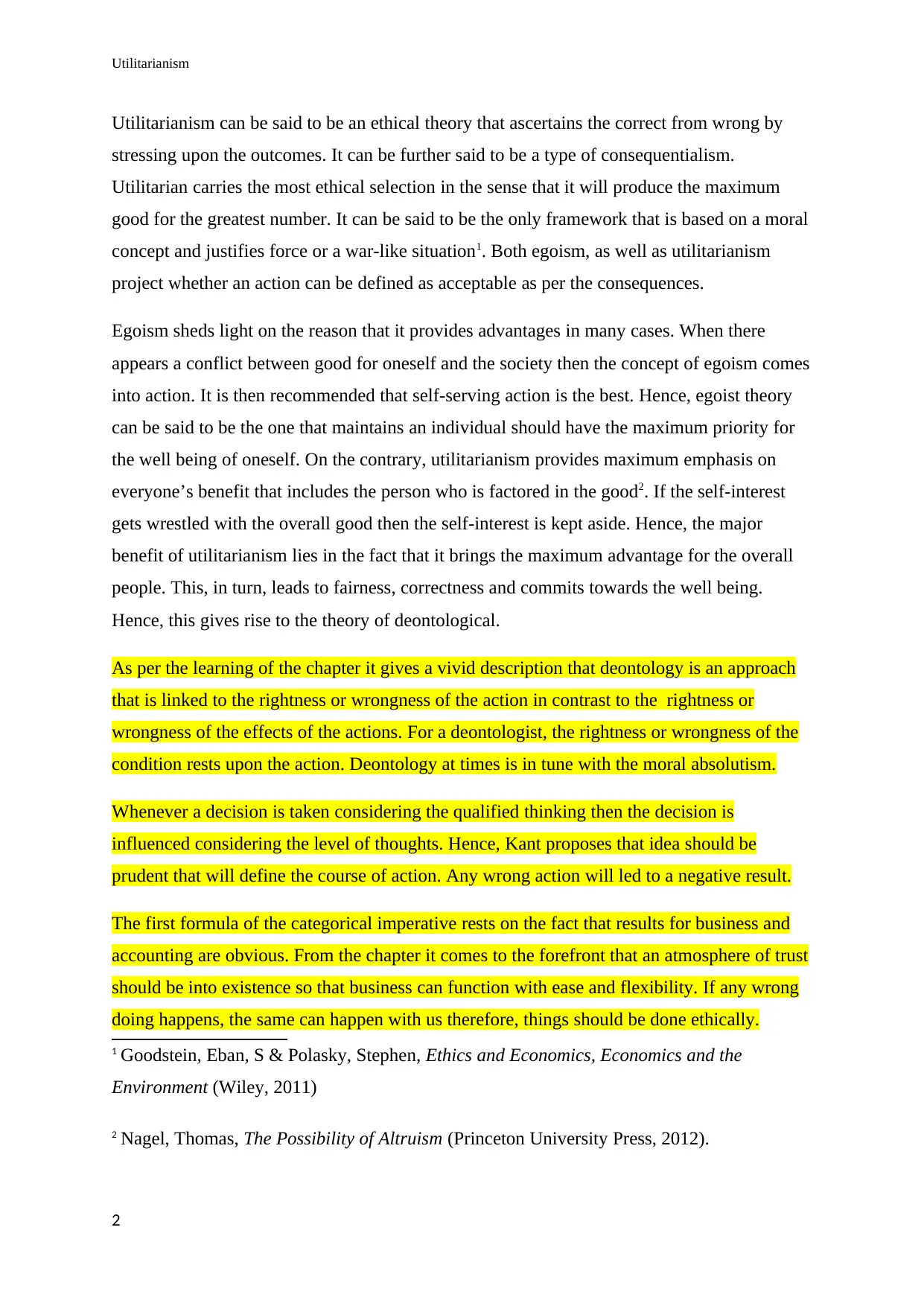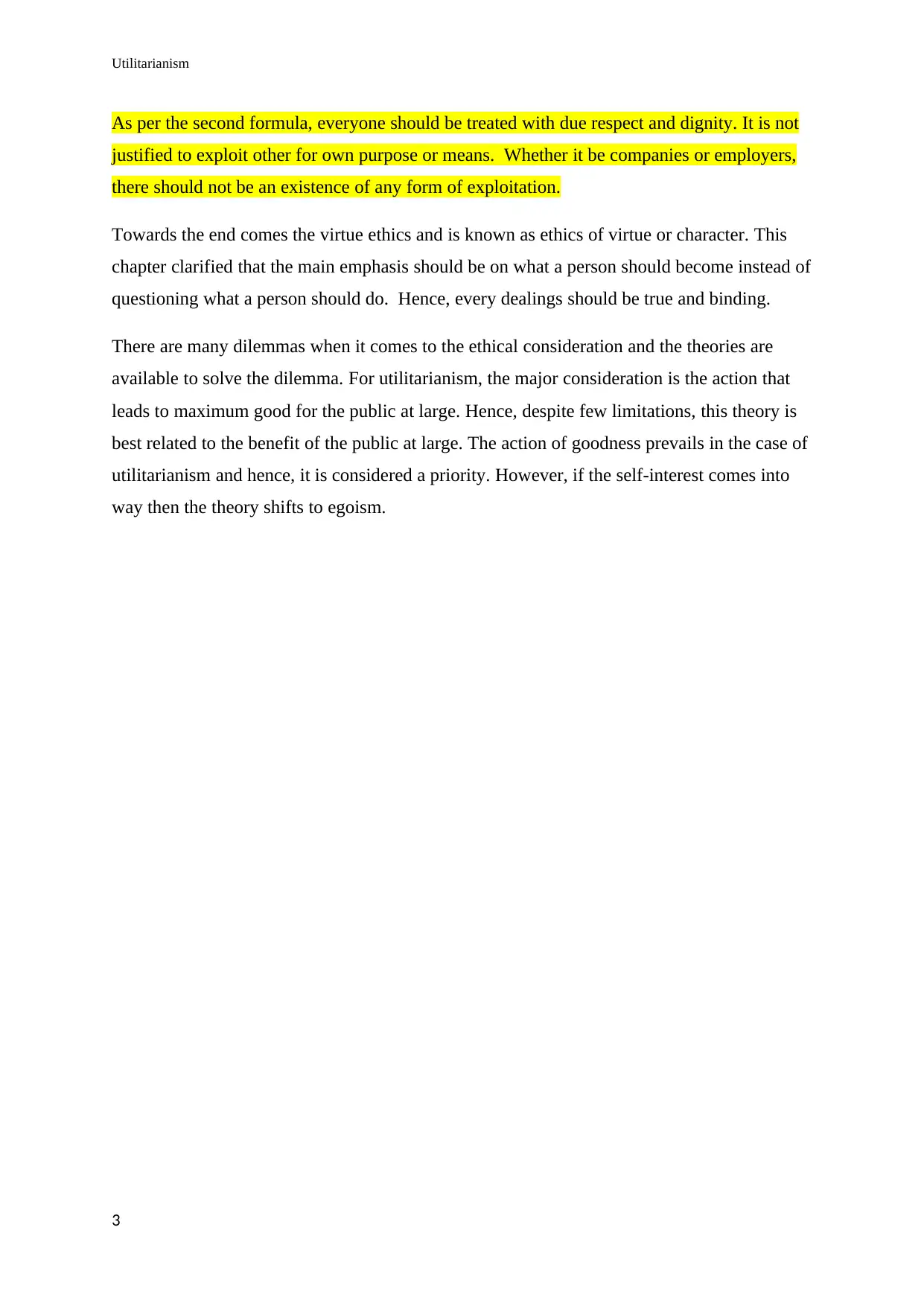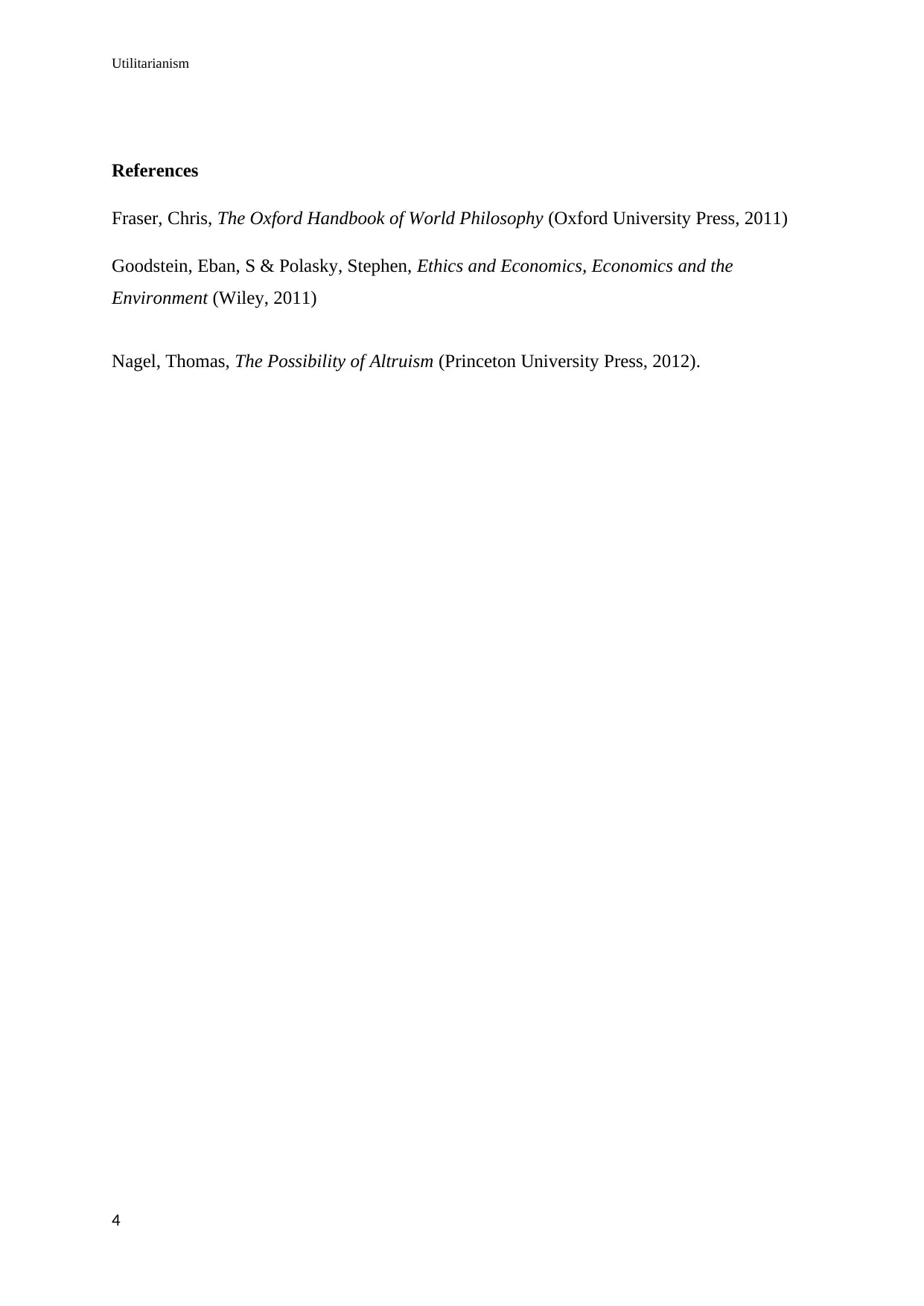Examining Ethical Frameworks: Utilitarianism, Egoism, and Deontology
VerifiedAdded on 2023/06/05
|4
|761
|139
Essay
AI Summary
This essay provides an overview of ethical theories, focusing on utilitarianism, egoism, deontology, and virtue ethics. It explains utilitarianism as a consequentialist theory that seeks to maximize good for the greatest number, contrasting it with egoism, which prioritizes self-interest. The essay also delves into deontology, which emphasizes the rightness or wrongness of actions themselves, and virtue ethics, which centers on developing a virtuous character. It highlights the importance of trust in business ethics and discusses how these theories can be applied to solve ethical dilemmas, particularly emphasizing utilitarianism's focus on the overall public good. Desklib offers more resources for students to explore these concepts further with solved assignments.

qwertyuiopasdfghjklzxcvbnmqwerty
uiopasdfghjklzxcvbnmqwertyuiopasd
fghjklzxcvbnmqwertyuiopasdfghjklzx
cvbnmqwertyuiopasdfghjklzxcvbnmq
wertyuiopasdfghjklzxcvbnmqwertyui
opasdfghjklzxcvbnmqwertyuiopasdfg
hjklzxcvbnmqwertyuiopasdfghjklzxc
vbnmqwertyuiopasdfghjklzxcvbnmq
wertyuiopasdfghjklzxcvbnmqwertyui
opasdfghjklzxcvbnmqwertyuiopasdfg
hjklzxcvbnmqwertyuiopasdfghjklzxc
vbnmqwertyuiopasdfghjklzxcvbnmq
wertyuiopasdfghjklzxcvbnmqwertyui
opasdfghjklzxcvbnmqwertyuiopasdfg
hjklzxcvbnmrtyuiopasdfghjklzxcvbn
mqwertyuiopasdfghjklzxcvbnmqwert
yuiopasdfghjklzxcvbnmqwertyuiopas
ETHICS
uiopasdfghjklzxcvbnmqwertyuiopasd
fghjklzxcvbnmqwertyuiopasdfghjklzx
cvbnmqwertyuiopasdfghjklzxcvbnmq
wertyuiopasdfghjklzxcvbnmqwertyui
opasdfghjklzxcvbnmqwertyuiopasdfg
hjklzxcvbnmqwertyuiopasdfghjklzxc
vbnmqwertyuiopasdfghjklzxcvbnmq
wertyuiopasdfghjklzxcvbnmqwertyui
opasdfghjklzxcvbnmqwertyuiopasdfg
hjklzxcvbnmqwertyuiopasdfghjklzxc
vbnmqwertyuiopasdfghjklzxcvbnmq
wertyuiopasdfghjklzxcvbnmqwertyui
opasdfghjklzxcvbnmqwertyuiopasdfg
hjklzxcvbnmrtyuiopasdfghjklzxcvbn
mqwertyuiopasdfghjklzxcvbnmqwert
yuiopasdfghjklzxcvbnmqwertyuiopas
ETHICS
Paraphrase This Document
Need a fresh take? Get an instant paraphrase of this document with our AI Paraphraser

Utilitarianism
Utilitarianism can be said to be an ethical theory that ascertains the correct from wrong by
stressing upon the outcomes. It can be further said to be a type of consequentialism.
Utilitarian carries the most ethical selection in the sense that it will produce the maximum
good for the greatest number. It can be said to be the only framework that is based on a moral
concept and justifies force or a war-like situation1. Both egoism, as well as utilitarianism
project whether an action can be defined as acceptable as per the consequences.
Egoism sheds light on the reason that it provides advantages in many cases. When there
appears a conflict between good for oneself and the society then the concept of egoism comes
into action. It is then recommended that self-serving action is the best. Hence, egoist theory
can be said to be the one that maintains an individual should have the maximum priority for
the well being of oneself. On the contrary, utilitarianism provides maximum emphasis on
everyone’s benefit that includes the person who is factored in the good2. If the self-interest
gets wrestled with the overall good then the self-interest is kept aside. Hence, the major
benefit of utilitarianism lies in the fact that it brings the maximum advantage for the overall
people. This, in turn, leads to fairness, correctness and commits towards the well being.
Hence, this gives rise to the theory of deontological.
As per the learning of the chapter it gives a vivid description that deontology is an approach
that is linked to the rightness or wrongness of the action in contrast to the rightness or
wrongness of the effects of the actions. For a deontologist, the rightness or wrongness of the
condition rests upon the action. Deontology at times is in tune with the moral absolutism.
Whenever a decision is taken considering the qualified thinking then the decision is
influenced considering the level of thoughts. Hence, Kant proposes that idea should be
prudent that will define the course of action. Any wrong action will led to a negative result.
The first formula of the categorical imperative rests on the fact that results for business and
accounting are obvious. From the chapter it comes to the forefront that an atmosphere of trust
should be into existence so that business can function with ease and flexibility. If any wrong
doing happens, the same can happen with us therefore, things should be done ethically.
1 Goodstein, Eban, S & Polasky, Stephen, Ethics and Economics, Economics and the
Environment (Wiley, 2011)
2 Nagel, Thomas, The Possibility of Altruism (Princeton University Press, 2012).
2
Utilitarianism can be said to be an ethical theory that ascertains the correct from wrong by
stressing upon the outcomes. It can be further said to be a type of consequentialism.
Utilitarian carries the most ethical selection in the sense that it will produce the maximum
good for the greatest number. It can be said to be the only framework that is based on a moral
concept and justifies force or a war-like situation1. Both egoism, as well as utilitarianism
project whether an action can be defined as acceptable as per the consequences.
Egoism sheds light on the reason that it provides advantages in many cases. When there
appears a conflict between good for oneself and the society then the concept of egoism comes
into action. It is then recommended that self-serving action is the best. Hence, egoist theory
can be said to be the one that maintains an individual should have the maximum priority for
the well being of oneself. On the contrary, utilitarianism provides maximum emphasis on
everyone’s benefit that includes the person who is factored in the good2. If the self-interest
gets wrestled with the overall good then the self-interest is kept aside. Hence, the major
benefit of utilitarianism lies in the fact that it brings the maximum advantage for the overall
people. This, in turn, leads to fairness, correctness and commits towards the well being.
Hence, this gives rise to the theory of deontological.
As per the learning of the chapter it gives a vivid description that deontology is an approach
that is linked to the rightness or wrongness of the action in contrast to the rightness or
wrongness of the effects of the actions. For a deontologist, the rightness or wrongness of the
condition rests upon the action. Deontology at times is in tune with the moral absolutism.
Whenever a decision is taken considering the qualified thinking then the decision is
influenced considering the level of thoughts. Hence, Kant proposes that idea should be
prudent that will define the course of action. Any wrong action will led to a negative result.
The first formula of the categorical imperative rests on the fact that results for business and
accounting are obvious. From the chapter it comes to the forefront that an atmosphere of trust
should be into existence so that business can function with ease and flexibility. If any wrong
doing happens, the same can happen with us therefore, things should be done ethically.
1 Goodstein, Eban, S & Polasky, Stephen, Ethics and Economics, Economics and the
Environment (Wiley, 2011)
2 Nagel, Thomas, The Possibility of Altruism (Princeton University Press, 2012).
2

Utilitarianism
As per the second formula, everyone should be treated with due respect and dignity. It is not
justified to exploit other for own purpose or means. Whether it be companies or employers,
there should not be an existence of any form of exploitation.
Towards the end comes the virtue ethics and is known as ethics of virtue or character. This
chapter clarified that the main emphasis should be on what a person should become instead of
questioning what a person should do. Hence, every dealings should be true and binding.
There are many dilemmas when it comes to the ethical consideration and the theories are
available to solve the dilemma. For utilitarianism, the major consideration is the action that
leads to maximum good for the public at large. Hence, despite few limitations, this theory is
best related to the benefit of the public at large. The action of goodness prevails in the case of
utilitarianism and hence, it is considered a priority. However, if the self-interest comes into
way then the theory shifts to egoism.
3
As per the second formula, everyone should be treated with due respect and dignity. It is not
justified to exploit other for own purpose or means. Whether it be companies or employers,
there should not be an existence of any form of exploitation.
Towards the end comes the virtue ethics and is known as ethics of virtue or character. This
chapter clarified that the main emphasis should be on what a person should become instead of
questioning what a person should do. Hence, every dealings should be true and binding.
There are many dilemmas when it comes to the ethical consideration and the theories are
available to solve the dilemma. For utilitarianism, the major consideration is the action that
leads to maximum good for the public at large. Hence, despite few limitations, this theory is
best related to the benefit of the public at large. The action of goodness prevails in the case of
utilitarianism and hence, it is considered a priority. However, if the self-interest comes into
way then the theory shifts to egoism.
3
⊘ This is a preview!⊘
Do you want full access?
Subscribe today to unlock all pages.

Trusted by 1+ million students worldwide

Utilitarianism
References
Fraser, Chris, The Oxford Handbook of World Philosophy (Oxford University Press, 2011)
Goodstein, Eban, S & Polasky, Stephen, Ethics and Economics, Economics and the
Environment (Wiley, 2011)
Nagel, Thomas, The Possibility of Altruism (Princeton University Press, 2012).
4
References
Fraser, Chris, The Oxford Handbook of World Philosophy (Oxford University Press, 2011)
Goodstein, Eban, S & Polasky, Stephen, Ethics and Economics, Economics and the
Environment (Wiley, 2011)
Nagel, Thomas, The Possibility of Altruism (Princeton University Press, 2012).
4
1 out of 4
Related Documents
Your All-in-One AI-Powered Toolkit for Academic Success.
+13062052269
info@desklib.com
Available 24*7 on WhatsApp / Email
![[object Object]](/_next/static/media/star-bottom.7253800d.svg)
Unlock your academic potential
Copyright © 2020–2026 A2Z Services. All Rights Reserved. Developed and managed by ZUCOL.





